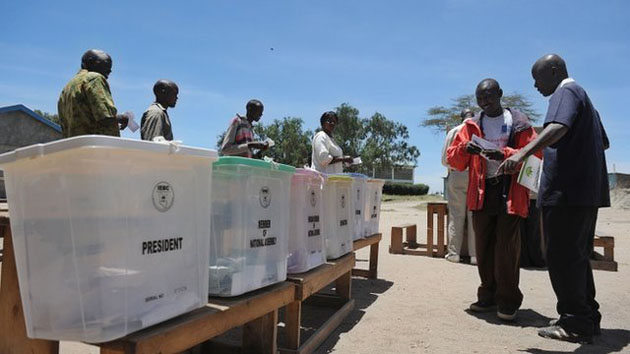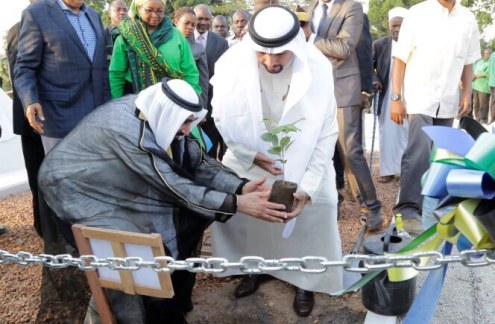President Muhammadu Buhari has constituted a seven-member committee to advise him on his plans to tackle corruption, THISDAY can exclusively reveal.
Named as the Presidential Advisory Committee on Anti-corruption, investigation by THISDAY reveals that the committee will be formally inaugurated this Monday at the Presidential Villa in Abuja.
Members of the committee are drawn largely from the academia. They are Professor Femi Odekunle, a professor of Criminology at the Ahmadu Bello University; Dr. (Mrs) Benedicta Daudu of the University of Jos; Professor Etannibi Alamika, a professor of Criminology and Sociology from the University of Jos; and Professor Sadia Radda also a professor of Criminology.
Others are Professor Itse Sagay (SAN), a professor of Law and a fierce commentator on national issues; Professor Bolaji Owasanoye, also a professor of Law at the Nigerian Institute of Advanced Legal Studies; and Mrs. Hadiza Bala Usman.
Curiously, no judge either sitting or retired made the list, a development that is causing disquiet among judges.
Many on the bench consider the president’s decision not to include one of their own in the committee as a vote of no confidence on the bench.
The president’s decision to exclude members of the bench from such an important committee may not be unconnected to his experience with the judiciary when he challenged three previous elections he contested in 2003, 2007 and 2011, a presidency source familiar with the development told THISDAY.
While challenging the results of presidential elections in which his opponents were declared winners, Buhari attended courts religiously and was able to assess judges closely.
He was said to have been disappointed with the way judges denied even the obvious while ruling against him.
During his recent visit to the United States of America, Buhari’s conviction that the Nigerian bench stinks of corruption was further confirmed by the United States’ Attorney General, Loretta Lynch.
Also, the US Department of State made it clear to Buhari that the judiciary must be purged of corrupt judges before he could expect the US to collaborate with him.
Details of the committee’s mandates will emerge today after the inauguration. Professor Odekunle is a 1968 graduate of the University of Ibadan and bagged his Ph.D. in sociology and social psychiatry from the University of Pennsylvania, Philadelphia, in the United States in 1974.
He taught at the Ahmadu Bello University (ABU) Zaria, Kaduna State, from 1970 to early 1990. In 1994, he was appointed Chairman, Advisory Committee to Chief of General Staff (CGS), General Oladipo Diya, on Socio-Political and Economic Matters.
Known as an avid opponent of corruption, Odekunle organised the first Anti-corruption Conference in Nigeria in 1987 bringing together not only people in government but petty traders on the streets to address the issue.
He is the author of Fighting Corruption and Organised Crime in Nigeria. Etannibi Alemika is a professor of Criminology and Sociology of Law, specialising in criminology, sociology of law, criminal justice reform, policy and practice, and security governance.
He holds BSc and MSc degrees in Sociology from the University of Ibadan, and an MSc and PhD in Criminology from the Department of Social System Sciences, Wharton Business School at the University of Pennsylvania.
He is a board member of several professional and academic organisations, including CLEEN Foundation in Nigeria; African Civilian Policing Oversight Forum (APCOF); and Altus Global Alliance, and a member of the American Society of Criminology and Academy of Criminal Justice Sciences.
Owasanoye is an erudite Professor of Law. He graduated from the University of Ife, Ile-lfe in 1984 with an LL.B (Hons) Upper Division and was called to the Bar in Nigeria in 1985.
He obtained an LL.M from the University of Lagos in 1987 and holds the following certificates: Legal Aspects of Debt and Financial Management from the United Nations Institute for Training and Research (UNITAR) (1991); Legislative Drafting from the Royal Institute of Public Administration in the UK and the Nigerian Institute of Advanced Legal Studies 1992; and Negotiation of international Trade Agreements from the International Law Institute, Washington.
Sagay is a distinguished legal scholar, a professor of Law and human rights activist, and a former Dean of the Faculty of Law, University of Benin.
He is a constitutional law expert and a Senior Advocate of Nigeria (SAN). A prolific writer, Sagay has written many books and countless articles.
In a related development, the president has ordered all federal ministries, departments and agencies (MDAs) to pay all government revenues, incomes and other receipts into a Treasury Single Account (TSA) with the Central Bank of Nigeria (CBN).
According to the directive, this measure is aimed at promoting transparency and facilitating compliance with Sections 80 and 162 of the constitution.
A statement by the Senior Special Assistant to the Vice-President, Media and Publicity, Laolu Akande, said all receipts due to the federal government or any of its agencies must be paid into the TSA or designated accounts maintained and operated in the CBN, except otherwise expressly approved.
A TSA is a unified structure of government bank accounts enabling consolidation and optimal utilisation of government cash resources. It is a bank account or a set of linked bank accounts through which the government transacts all its receipts and payments and gets a consolidated view of its cash position at any given time.
Agencies like the CBN, Securities and Exchange Commission (SEC), Corporate Affairs Commission (CAC), Nigerian Ports Authority (NPA), Nigerian Communications Commission (NCC), Federal Airports Authority of Nigeria (FAAN), Nigerian Civil Aviation Authority (NCAA), Nigerian Maritime Administration and Safety Agency (NIMASA), Nigeria Deposit Insurance Corporation (NDIC), Nigeria Customs Service (NCS), Nigerian National Petroleum Corporation (NNPC), Federal Inland Revenue Service (FIRS) and Department of Petroleum Resources (DPR), among others, are affected by the directive.
According to the statement, the directive will end the era of several fragmented accounts for government revenues, incomes and receipts, which in the recent past had resulted in losses or leakages of legitimate income meant for the Federation Account.
Buhari had earlier promised state governors at the inaugural meeting of the National Economic Council (NEC) in June, that all revenues prescribed for lodgment into the Federation Account would be treated as such under his watch and that he would ensure strict compliance with all relevant laws on accounting, allocation and disbursement.
Since then, the presidency has worked with relevant agencies of the federal government to evolve this policy directive.
This directive applies to fully funded organs of government like the MDAs and foreign missions, as well as partially funded ones, like teaching hospitals, medical centres, federal tertiary institutions, etc.
For any agency that is fully or partially self-funding, sub-accounts linked to the TSA are to be maintained at CBN and the accounting system will be configured to allow them access to funds based on their approved budgetary provisions, the statement said.



